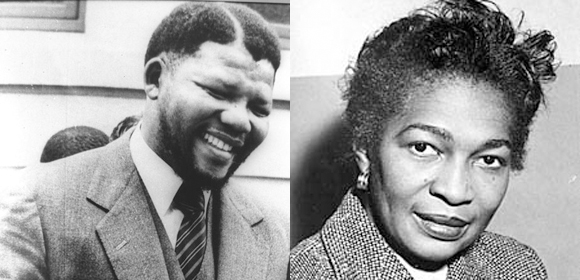To erase the political bedrock of people’s beliefs from the telling of their history is to distort their life’s work.
The rewriting of history and reputation to chime with what the white-media-middle-class is ‘comfortable’ with does not just apply to Nelson Mandela,[1] it has for some years been applied in this country to Black revolutionary Claudia Jones too. After an almost complete neglect of her reputation from her solitary death in 1964 to Buzz Johnson’s 1984 book, I think of my mother: notes on the life and times of Claudia Jones, she has gradually become better known, her history reclaimed[2] and her contribution acknowledged beyond Britain’s black community. There are now two plaques commemorating her in London, in 2008 she made it onto a postage stamp (admittedly for Black History Month) and now it is rumoured that a biopic is under discussion by film executives. But the more revered and mainstreamed she has become, the more her genuine political talents and commitments have been slowly revised, cleansed and repackaged to meet contemporary fads.
Claudia Jones was a staunch revolutionary. Her Communism, which for the most part, bound her (as it did her comrades) to following the Soviet line, informed everything she believed – her internationalism, her anti-colonialism, her stand against ‘colour bar’, her view that (when she became a Maoist) ‘women held up half the sky’ and so on. Read her speeches, her articles in the West Indian Gazette; examine the company she kept, such as that of partner Abhimanyu Manchanda. Under McCarthyism she was deported from the USA in 1955 and arrived in Britain because Trinidad and Tobago, her homeland, then under British rule, did not want her back.
To provide this backdrop is not, in any way, to detract from her tenacity and her achievements but rather to set them in their right context. For just as Mandela is now celebrated for his forgiveness and generosity of spirit – in a Christian saintly tradition – Claudia Jones, too, is celebrated in a similar vein. She is revered now for her contribution to Britain’s multicultural vivacity – via the Notting Hill Carnival. But today’s Carnival has very little to do with what she began in 1959 or why. She suggested a kind of spirited celebration with calypso to remind West Indians of home, and it was held in a town hall. The reason was to wash the taste of the racism of the anti-black riots of 1958 ‘out of our mouths’. Similarly, she is embraced now as a leading feminist. But her ‘feminism’ was about the emancipation of the ‘Negro woman’; for her the personal was not the political – rather the political was personal. She should not be read out of her time, put on a liberal pedestal to please contemporary palates. Claudia Jones was tremendously industrious, influential and majestic – a political icon and role model if ever there was one. But she also ran fashion pageants (the sort of beauty shows derided by feminists within a decade) and advertised hair straightening products in her paper. That was her time.
Just as in the case of Nelson Mandela, one can hazard that her greatness and strength were honed both through the hardships she underwent (including incarceration, deportation, poverty and ill-health) and the discipline and rigour of party politics. It was in the party that she began to analyse, write and to organise. She did not believe, as Mandela did not believe, that capitalism (like apartheid) would just roll over and die – it would take long and concerted revolutionary struggle. To erase the political bedrock of people’s beliefs from the telling of their history is not just a monstrous distortion of their life’s work, but is also a very bad political lesson for those trying to change the world in their wake.

